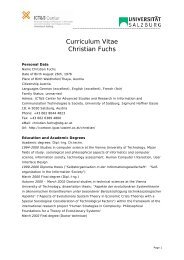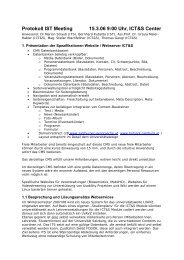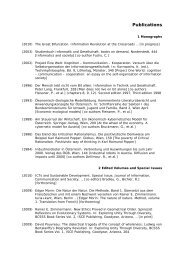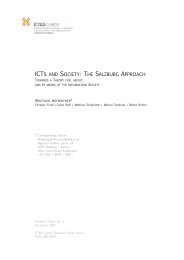CHRISTIAN FUCHS - ICT&S - Universität Salzburg
CHRISTIAN FUCHS - ICT&S - Universität Salzburg
CHRISTIAN FUCHS - ICT&S - Universität Salzburg
You also want an ePaper? Increase the reach of your titles
YUMPU automatically turns print PDFs into web optimized ePapers that Google loves.
Christian Fuchs: Social Networking Sites and the Surveillance Society“every way of acting, fixed or not, capable of exerting on the individual anexternal constraint; or: which is general over the whole of a given society whilsthaving an existence of its own, independent of its individual manifestation”(Durkheim 1982: 59).A second group of authors argues that the web and software are only social if theysupport symbolic interaction (boyd 2005, 2007a; Coates 2005, Webb 2004, Pascu et al.2007, Shirky 2003). The notion of the social underlying these approaches can be said tobe Weberian (Fuchs 2009) because Max Weber argued that not “every type of contactof human beings has a social character; this is rather confined to cases where theactor's behavior is meaningfully oriented to that of others” (Weber 1968: 22-23).A third group of authors sees social software and web 2.0 as tools that supportcommunity-building and online co-operation (Alby 2007, Burg 2003, Fischer 2006,Gillmor 2006, Miller 2005, O’Reilly 2005a, b; Saveri/Rheingold/Vian 2005, Stefanac2007, Swisher 2007, Kolbitsch/Maurer 2006, Tapscott/Williams 2006). Theseapproaches can be connected on the one hand to Tönnies’ concept of community(Fuchs 2009), by which he understands the “consciousness of belonging together andthe affirmation of the condition of mutual dependence” (Tönnies 1988: 69), and on theother hand to Marx’s concept of co-operation (Fuchs 2009):“By social we understand the co-operation of several individuals, no matter underwhat conditions, in what manner and to what end. It follows from this that acertain mode of production, or industrial stage, is always combined with a certainmode of co-operation, or social stage, and this mode of co-operation is itself a’productive force’” (MEW 3: 50).These theoretical understandings of the social that underlie definitions of web 2.0 andsocial software are implicit, a theory of web 2.0 and social software is missing and canbe accomplished by dialectically synthesizing the three understandings of the socialand applying it to the web (Fuchs 2009, Fuchs, Hofkirchner, Schafranek, Raffl, Sandoval& Bichler 2008).Actually, it makes sense to develop an integrative view of these three sociality typesrather than to look upon them as separate ones. There are two reasons for that: first, thestructural, the action, and the cooperation type of sociality can easily be integrated inthe way the Aristotelian genus proximum and differentia specifica are linked together.Durkheim's notion of the fait social is the most abstract notion. As such it also applies toactions that – in the sense of Weber – are directed towards other members of societyand, beyond that, to the production of common goods within a community in theTönniesian and Marxian sense.Defining sociality in the mode Weber does can be seen as making the case for a moreconcrete and more particular type of sociality than the Durkheimian one: the latterunderlies the former. And the Tönnies–Marx concept, finally, is still less general and asubcategory of the Weberian one. Thus they form a kind of hierarchy in which thesuccessor is a logical modification of the predecessor: it takes place under certainconstraining conditions.5









